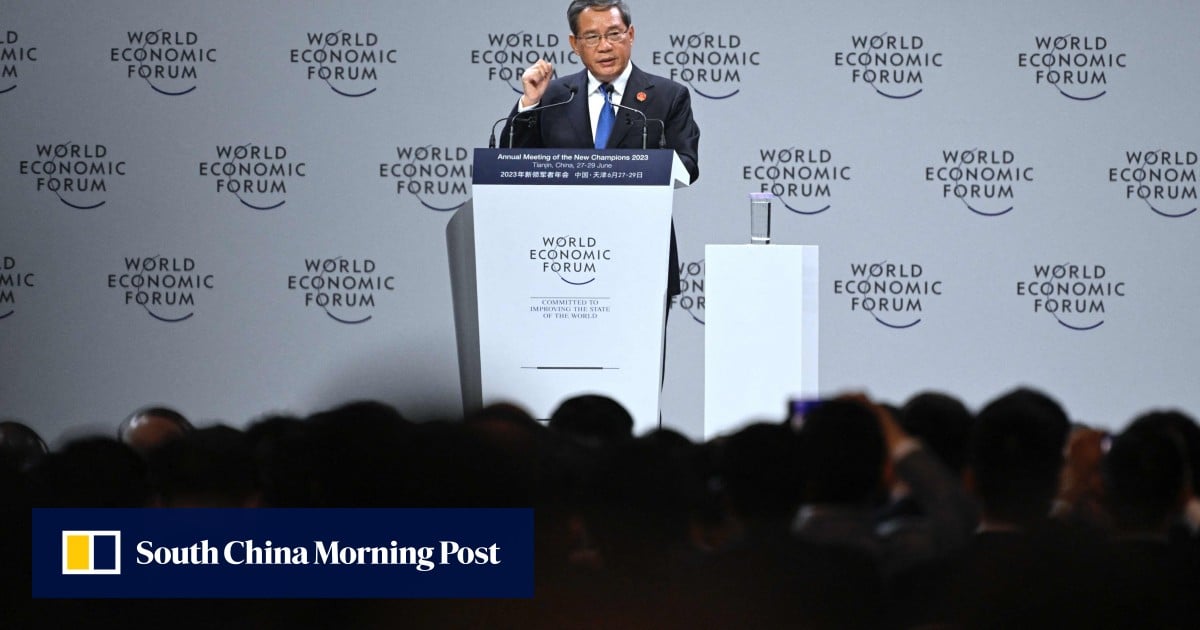
He said Beijing has “full confidence” in seeing stable growth in a “longer-term economic cycle”, which would lead to a continuous expansion of the market, creation of opportunities for cooperation, chances for investors from all countries and the recovery of the world economy.
Li admitted that China’s domestic development is not yet “balanced”, but blamed external factors for causing “enormous destruction” to the world’s development.
“Some people have been fanning ideological opposition, inciting hatred and containment. Occasional regional conflicts and wars are still happening,” Li said, without naming specific countries.
However, Li made a direct rebuke to increasing calls “from the West” for “de-risking”.
“We know that there are some in the West calling for ‘de-risking’ and ‘reducing reliance’, I think these two phrases are false propositions,” he said.
“Even if a certain industry faces supply-chain risks, it should not be up to the government or any organisations to decide what to do. Enterprises are the most sensitive towards economic risks and industrial challenges, so they should have the say.
“The government or any relevant organisations should not be in the way, to expand, politicise or turn the risks into an ideological fight. This would bring many problems.”
The clear message was to show entrepreneurs it is normal to see risks and competition
Li specifically highlighted his recent six-day visit to Germany and France, where he said policymakers and business executives agreed that there should be more of a mindset for cooperation instead of a “zero-sum game”.
Beijing has adopted the phrase when accusing the United States of wanting to contain China’s development.
Li’s message came amid the backdrop of widening economic and tech competition between the US and China, with US President Joe Biden and his European allies stressing their desire to “de-risk” and not “decouple” from the Chinese economy during a Group of 7 meeting in May.
“The clear message was to show entrepreneurs it is normal to see risks and competition … and that companies should not be misled that there is a difference between calls of ‘decoupling’ and ‘de-risking’, as both would be seen as having the same nature of targeting China, which would increase risks to the global economy,” said Wang Yiwei, an international relations professor at Renmin University, who attended the opening ceremony on Tuesday.
Also at the forum on Tuesday, Zhang Yuzhuo, head of the State-owned Assets Supervision and Administration Commission of the State Council, said that both external and internal factors will continue to pose challenges to China’s economic recovery.
“[In] terms of foreign trade, the growth was below what we had expected because, globally speaking in the first five months, it was quite modest,” he said, adding that “trade barriers” have posed new barriers to global trade.
“We often hear talk of decoupling and related practices that would also certainly impede international cooperation in trade.”
Domestically, Zhang said, China needs to create new “growth points”.
[embedded content]
“For consumption, consumption growth was also below our expectations. Some emerging sectors still need to be scaled up to generate a bigger impact,” Zhang added.
Market expectations are that China’s economy will have grown in the second quarter, partially driven by a low base of comparison from the same period last year.
The economic powerhouse of Shanghai, where Li was party secretary until he was promoted in March, endured a two-month lockdown last year from April to May.
The restrictions led to a knock-down effect on the economy, including zero car sales being reported in Shanghai in April last year.
I think we would like to see a world that continues to be open and outward-looking
However, the strength of China’s post-Covid rebound has disappointed economists and investors as the nationwide pickup in retail sales, investments and industrial production has displayed slowing growth.
New Zealand Prime Minister Chris Hipkins told another panel at the forum on Tuesday that “uncertainties” in the world had pushed some countries to be “more inward looking” amid discussions about how the current geopolitical situation has led to new tariffs and protectionism, and a disconnect between China and the US.
“I think we would like to see a world that continues to be open and outward-looking,” Hipkins said, adding that climate change and the changing demographics within populations are set to be common problems.
“The whole world is going to have to grapple with that. And so, I don’t think an inward-looking focus for any country is going to save their long-term interests, particularly.”


